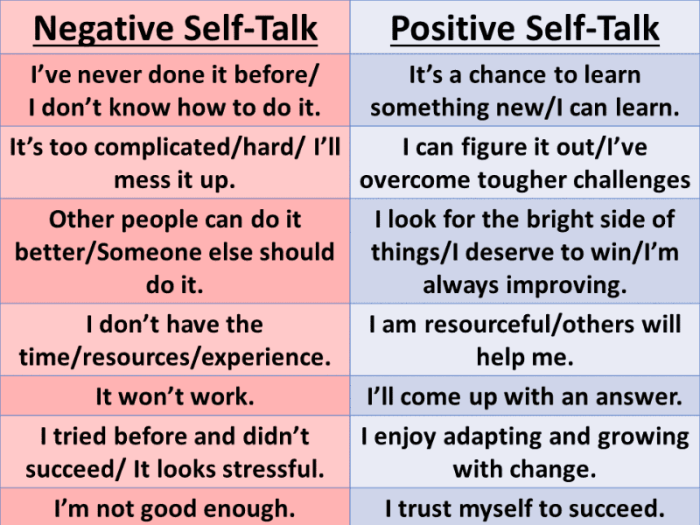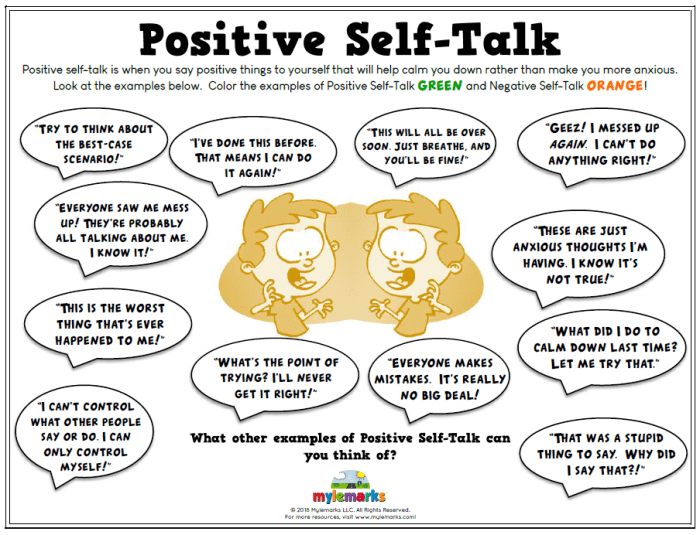Example of negative self talk crossword, an intriguing concept that merges the complexities of language and mental health, invites us on a journey to decode the subtle nuances of self-criticism hidden within the grids of crossword puzzles. By embarking on this exploration, we not only enhance our puzzle-solving skills but also gain valuable insights into the profound impact of negative self-talk on our well-being.
Within the realm of crossword puzzles, negative self-talk manifests in various forms, from subtle hints to overt declarations. Recognizing and addressing these instances becomes crucial in fostering a healthier mindset. This guide delves into the intricacies of identifying and overcoming negative self-talk, empowering us to transform crossword puzzles from mere brain teasers into tools for personal growth.
Understanding Negative Self-Talk: Example Of Negative Self Talk Crossword
Negative self-talk is a common form of inner dialogue that involves criticizing or belittling oneself. It can take many forms, including self-criticism, self-blame, and self-doubt. Negative self-talk can have a significant impact on mental health, contributing to low self-esteem, anxiety, and depression.
Identifying Common Examples of Negative Self-Talk, Example of negative self talk crossword
- I’m not good enough.
- I’m a failure.
- I’ll never be able to do anything right.
- I’m so stupid.
- I’m worthless.
Identifying Negative Self-Talk in Crossword Puzzles

Crossword puzzles often contain clues that can trigger negative self-talk. For example, a clue that asks for a synonym for “stupid” may prompt someone to think negatively about their own intelligence. Similarly, a clue that asks for a word to describe a “failure” may lead someone to focus on their own shortcomings.
Challenges of Identifying Negative Self-Talk in Crossword Puzzles
- The clues are often ambiguous and can be interpreted in multiple ways.
- The time pressure of solving the puzzle can make it difficult to think critically about the clues.
- The desire to find the correct answer can lead people to overlook the negative implications of the clues.
Overcoming Negative Self-Talk

Overcoming negative self-talk is an important step towards improving mental health. There are a number of techniques that can be used to challenge negative thoughts and replace them with more positive ones.
Techniques for Overcoming Negative Self-Talk
- Identify your negative thoughts.The first step to overcoming negative self-talk is to become aware of the thoughts that you are having. Pay attention to the way you talk to yourself, both internally and externally.
- Challenge your negative thoughts.Once you have identified your negative thoughts, challenge them. Ask yourself if there is any evidence to support your negative thoughts. Are you really as worthless as you think you are? Are you really never going to be able to do anything right?
- Replace your negative thoughts with positive ones.Once you have challenged your negative thoughts, replace them with more positive ones. This can be difficult at first, but it is important to be patient and persistent.
Case Study: Analyzing a Crossword Puzzle for Negative Self-Talk

The following crossword puzzle contains several clues that could trigger negative self-talk:
| Clue | Answer |
|---|---|
| A synonym for “stupid” | IDIOT |
| A word to describe a “failure” | LOSER |
| A word to describe someone who is “worthless” | BUM |
Analysis
The clues in this crossword puzzle are all negative and could lead people to think negatively about themselves. For example, the clue “A synonym for ‘stupid'” could prompt someone to think that they are stupid. Similarly, the clue “A word to describe a ‘failure'” could lead someone to focus on their own shortcomings.
It is important to be aware of the potential for negative self-talk when solving crossword puzzles. If you find yourself thinking negatively about yourself, challenge your thoughts and replace them with more positive ones.
User Queries
What is the significance of identifying negative self-talk in crossword puzzles?
Recognizing negative self-talk in crossword puzzles allows us to become aware of our self-critical thoughts and challenge their validity. This process fosters a healthier inner dialogue and promotes overall well-being.
How can we overcome negative self-talk encountered in crossword puzzles?
Overcoming negative self-talk involves techniques such as reframing thoughts, challenging distorted beliefs, and practicing self-compassion. By replacing negative thoughts with positive affirmations, we can gradually reshape our self-perception and cultivate a more optimistic outlook.
What are the benefits of using crossword puzzles to address negative self-talk?
Crossword puzzles provide a structured and engaging platform for self-reflection. They encourage us to examine our thoughts and identify patterns of negative self-talk, promoting a deeper understanding of our inner dialogue and its impact on our mental health.
